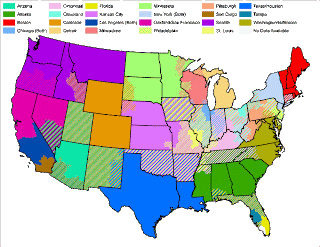Major League Baseball's television blackout policies are the subject of a class action antitrust lawsuit that was filed on Wednesday in the Southern District of New York. The plaintiffs in Garber v. MLB allege that the league has violated Sections One and Two of the Sherman Act by unfairly restricting its fans' ability to watch out-of-market broadcasts in two primary ways. First, through its MLB Extra Innings cable package and MLB.tv Internet package, MLB refuses to offer fans the ability to purchase just their favorite team's games, instead requiring consumers to purchase a package including all out-of-market MLB broadcasts. Second, both the Extra Innings and MLB.tv packages blackout any games broadcast locally via a regional sports network (RSN), meaning that fans cannot use those packages to watch their local team play, but must instead purchase a cable subscription to watch the games on their local RSN. The complaint alleges that these exclusive broadcasting policies drive up subscription fees for all cable consumers by enabling the RSNs to charge monopoly prices for their highly desirable sports programming. The Garber plaintiffs' complaint is available here, while MLB's specific blackout policies are explained here (and depicted in the accompanying map).
The lawsuit was filed by the same law firm (Pomerantz, Haudek, Grossman & Gross) that filed a similar class action antitrust suit against the NHL in March 2012 (Laumann v. NHL). Two of the three named plaintiffs in the NHL case (Fernanda Garber and Robert Silver) are among the four named plaintiffs in the MLB lawsuit.
Interestingly, the Garber suit does not name all 30 MLB teams as defendants, instead suing only the Chicago Cubs, Chicago White Sox, Colorado Rockies, New York Yankees, Oakland A's, Philadelphia Phillies, Pittsburgh Pirates, San Francisco Giants, and Seattle Mariners, along with the Office of the Commissioner, MLB Advanced Media, DirecTV, Comcast, and various RSNs. Notably, the suit does not name any of the Fox Sports RSNs as defendants, nor any of the teams whose games are primarily broadcast on the Fox Sports networks. Instead, the suit targets only those teams whose games are televised on an RSN owned by DirecTV or Comcast (the one exception being the Yankees, who own their own proprietary RSN, the YES network). It is not immediately clear why the attorneys limited their allegations only to DirecTV and Comcast affiliates, but it may have something to do with a desire to pursue damages from cable service providers based on the allegations that all cable consumers have been charged higher prices due to MLB's exclusive broadcast policies.
One major hurdle the plaintiffs will have to overcome in their suit against MLB, of course, is baseball's historic exemption from antitrust law. Following the Supreme Court's 1972 decision in Flood v. Kuhn, lower courts have been divided regarding how broadly the exemption applies. As I explained in a recent law review article, subsequent lower courts have generally adopted one of three approaches to the exemption: (i) holding that the exemption broadly shields the entire business of baseball, (ii) holding that the exemption shields only the reserve clause (the specific restraint at issue in Flood), or (iii) holding that the exemption shields baseball's "unique characteristics and needs."
In Postema v. National League, 799 F. Supp. 1475 (S.D.N.Y. 1992), the Southern District of New York adopted the latter approach, holding that baseball's exemption did not shield the league from a suit filed by a former umpire because “[a]nti-competitive conduct toward umpires is not an essential part of baseball.” Id. at 1489. Undoubtedly hoping to draw upon this precedent and the related line of cases, the complaint in Garber argues that MLB's TV policies do not "reflect anything unique to baseball" insofar as "they are essentially identical to those in other major sports." Complaint at Paragraph 8.
The plaintiffs also seek to avoid application of the antitrust exemption by citing to Henderson Broadcasting Corp. v. Houston Sports Ass’n, 541 F. Supp. 263 (S.D. Tex. 1982), a case in which the Southern District of Texas ruled that the exemption did not apply to a dispute involving the Houston Astros' local radio broadcasting agreements. Based on this precedent, the Garber plaintiffs argue that the "distribution of video presentation of baseball games is subject to the antitrust laws." Complaint at Paragraph 8.
It will be interesting to see how the Garber court handles the antitrust exemption issue. Personally, I believe the "unique characteristics and needs" standard -- drawing upon dicta in Flood -- is flawed, given that the Supreme Court did not itself apply any such standard in the Flood case. I have similarly argued that the Henderson decision is poorly reasoned in several respects. As a result, I believe that baseball's broadcasting activities are encompassed by the exemption. Nevertheless, the Postema and Henderson precedents could give the Garber court a potential basis for discarding baseball's antitrust exemption, if it is so inclined.
It will also be interesting to see if the Garber lawsuit finally motivates MLB to update its antiquated television blackout policies. The rules have been frequently criticized by baseball fans, and can lead to absurd outcomes such as fans in Iowa being unable to watch any game involving the Twins, Royals, White Sox, Brewers, Cubs, or Cardinals on either the MLB Extra Innings or MLB.tv packages, even though in many cases none of those teams' games are available from their local cable provider. MLB has reportedly been considering updating the rules for years, but has yet to act. Perhaps this threat to its cherished antitrust exemption, along with potential treble damages, will finally force the league to act.

No comments:
Post a Comment